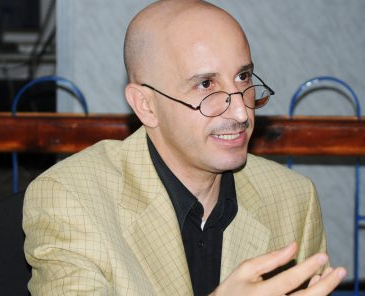

Published on 22 April 2021 in Action alerts Blasphemy news
Algeria: academic convicted ‘blasphemy’
Today’s ruling, condemning Islamic scholar Said Djabelkhir to three years in prison is a damning blow to academic freedom in Algeria, said the End Blasphemy Laws Coalition today.

Algerian academic, Said Djabelkhir
Speaking to the AFP outside the court, Djabelkhir stated:
“It is a fight that must continue for freedom of conscience, for freedom of opinion and for freedom of expression. The fight for freedom of conscience is non-negotiable.”
His conviction follows a complaint signed by 19 individuals and filed by a fellow academic who took objection to his writings on various Islamic rituals, such as Hajj and animal sacrifices on Eid, among other critiques, alleging that they constituted “an attack and mockery of the authentic hadiths of the Sunna [the custom and practice] of the Prophet,” and had caused individuals psychological harm.

EBL Coalition Coordinator, Emma Wadsworth-Jones
Responding to today’s ruling, Coordinator of the End Blasphemy Laws Coalition, Emma Wadsworth-Jones stated:
“Academic inquiry – for which the ability to question and critically assess are key components – is an essential part of the individual freedoms protected under international law and universal to all. Religious doctrine and dogma is not exempt from study, analysis or critique. The use of the country’s blasphemy law against peaceful and legitimate academic inquiry sets a dangerous precedent for academic freedom in the country.”
Article 144 bis 2 of the Algerian Penal Code (in French) proscribes a punishment of three to five years in prison to “anyone who offends the prophet and the envoys of God or denigrates the dogma or the precepts of Islam, whether by writing, drawing, declaration or any other means.” The law is interpreted widely; in January this year, the law was used to prosecute Algerian political activist, Walid Kechida, who had shared a series of political memes on Facebook. Kechida was released on time served following the reduction of his sentence on appeal.
The article comes into clear conflict with the principle of academic freedom, which is protected under a network of articles enshrined in international law, including Article 13 of the International Covenant on Economic, Social, and Cultural Rights of 1966 (ICESCR), Article 19 of the International Covenant on Civil and Political Rights, to which Algeria is a State Party.
The End Blasphemy Laws Coalition calls on the Algerian authorities to quash the conviction of academic Said Djabelkhir and to repeal its ‘blasphemy’ law.